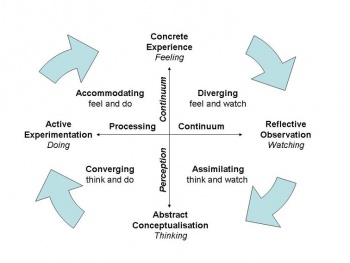Learning styles
| [▲]Foundation Skills | |
|---|---|
| Learning styles/preferences | |
| Learning styles and conceptions of learning | Objectives | Learning Styles | Conceptions of Learning | e-Activity | Summary |
David Kolb has developed an Experiential Learning Cycle, which depicts learning in a four point cycle, and the associated learning styles.
The University of Leicester website suggests activities alongside each of the four stages to help the development of learning.
Neil Fleming identified four learning styles -these are: Visual, Aural, Reading/Writing, and Kinesthetic (VARK). Visual learners learn best by observing and watching how things are done, aural learners learn best through listening, reading/writing learners prefer text-based learning activities, while kinesthetic learners prefer learning by doing, feeling and touching. Although you or your learners may have a strong preference for one or two learning styles, in reality most of us are multimodal learners, i.e. we use a combination of learning styles, depending on the context. You may wish to visit the VARK website for a more detailed explanation of Fleming's four learning styles.
Of course there are some authors who do not believe in the concept of learning styles. One example of an argument against learning styles is Riener and Willingham's article The Myth of Learning Styles. What do you think of their ideas?
Activity
| What type of learner are you? There are a number of online questionnaires that one can use to give you some idea of your learning style preferences.
Your first activity in this topic requires you to complete a simple online VARK questionnaire. Assessing your learning style with VARK provides an explanation of the VARK questionnaire. After watching this video clip, you may want to complete the VARK questionnaire - this should take under 10 minutes. After completing the questionnaire, reflect on the results:
|
Extra resources
| As an extension of the concept of learning styles, you may want to find out more about Howard Gardner's Multiple Intelligences. Gardner identified nine intelligences which he believes all people have. A really great video clip also explains multiple intelligences in a nice simple way.
|
